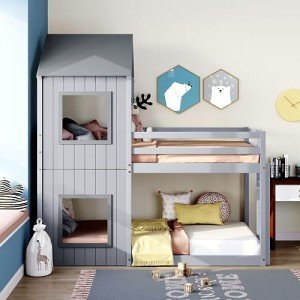Who Is Kids Bunk Bed And Why You Should Take A Look
The Ultimate Guide to Kids Bunk Beds: Maximizing Space and Fun
With the increase of vertical living and smaller sized areas, the appeal of bunk beds has soared amongst households. Bunk beds not just provide a practical sleeping service, particularly in shared spaces, however they likewise bring a component of fun into a child's life. deedrehs.top looks into the functions, benefits, and factors to consider of kids' bunk beds, making it simpler for parents to choose the best bed for their youngsters.
Functions of Kids Bunk Beds
Bunk beds are versatile furniture pieces that serve more than a single purpose. Here are some essential features to consider:
Feature
Description
Material
Bunk beds can be constructed from wood, metal, or a combination of both, providing varying levels of toughness and design options.
Security Features
A lot of bunk beds come equipped with guardrails, secure ladders, and topped assistances for security, especially essential for kids.
Design Variety
Options range from classic styles to modern-day styles, making sure a match for any space décor.
Space-Efficiency
Bunk beds make use of vertical space, making them perfect for smaller spaces.
Convertible Options
Some models can be transformed into 2 different beds, offering versatility as children grow.
Storage Solutions
Some bunk beds feature built-in storage drawers or racks, assisting to keep the space arranged.
Benefits of Kids Bunk Beds
Purchasing a bunk bed features numerous benefits:
- Space Saving: Bunk beds take full advantage of floor space, permitting more play location or storage options.
- Fun Factor: With a bunk bed, kids belong that cultivates imagination and friendship during pajama parties or playdates.
- Cost-Effective: Instead of acquiring 2 different beds, a bunk bed can accommodate 2 children at the same time, saving cash in the long run.
- Flexibility: Many bunk beds can be dismantled or transformed into twin beds, making them a long-lasting investment as kids's requirements change.
- Social Interaction: Bunk beds encourage household bonding and relationships, supplying an inviting space for kids to share stories and laughter.
Considerations When Choosing a Kids Bunk Bed
When selecting the best bunk bed for a child, parents ought to take into consideration different factors:
- Safety Standards: Ensure that the bunk bed complies with security policies and includes necessary security functions.
- Age Appropriateness: Different models deal with various age groups. For instance, traditional bunk beds may not be ideal for more youthful children.
- Room Dimensions: Measure the bed room to guarantee the bunk bed fits properly, enabling space to walk around comfortably.
- Weight Capacity: Consider the weight load of each bed and ensure it accommodates the kid's weight comfortably.
- Design Preferences: Letting kids take part in the selection procedure can assist them feel more ecstatic about their new bed.
Kinds Of Kids Bunk Beds
Bunk beds come in various designs and configurations to suit various needs:
Type
Description
Standard Bunk Bed
A traditional design with one bed stacked on top of another, normally utilizing a ladder to access the leading bunk.
L-Shaped Bunk Bed
Functions two bunk beds linked in an L-shape, frequently more spacious and appropriate for kids sharing a room however needing a bit more space.
Triple Bunk Bed
Comprises three stacked beds, suitable for taking full advantage of sleeping arrangements in really limited areas.
Loft Bed
A raised bed with space beneath that can work as a play area, research study corner, or additional storage.
Futon Bunk Bed
Combines a bunk bed on leading with a futon or sofa below, making it great for sleepovers and optimizing space use.
Convertible Bunk Bed
Can be separated into 2 private beds, providing flexibility as children's needs alter.
Taking Care Of Kids Bunk Beds
Keeping bunk beds is vital for ensuring durability and safety. Here are some basic care practices:
- Regular Inspections: Check the bed frequently for loose screws and tightened up bolts to guarantee stability.
- Cleanliness: Keep bedding tidy and fresh, turning mattresses for even wear.
- Guardrails: Ensure guardrails are safe and in location, particularly if kids tend to move around a lot in their sleep.
- Air Circulation: Ensure the bed has sufficient airflow, avoiding wetness buildup that can result in mold or mildew.
FAQs About Kids Bunk Beds
Q1: At what age can a child securely use a bunk bed?
A1: Generally, kids aged six and older are thought about safe to utilize the upper bunk due to the height and stability factors involved.
Q2: Can I position a bunk bed near a window?
A2: It is recommended to prevent positioning a bunk bed near windows to lower the risk of falling or injuries.
Q3: Are bunk beds safe for more youthful kids?
A3: While some contemporary bunk beds include safety functions accommodating younger kids, it is usually suggested to wait up until they are older, normally over six years.
Q4: What is the typical weight limitation for leading bunks?
A4: Weight limits vary by model but generally range from 150 to 250 pounds. Always describe the manufacturer's specifications.
Q5: How typically should I check the bunk bed's safety features?
A5: It is advisable to perform a security check every few months or whenever you see any signs of wear.
Kids' bunk beds serve as a tactical service for households seeking to take full advantage of space while providing a fun and appealing sleeping environment for their children. With a range of alternatives available— from basic designs to loft beds— parents have the flexibility to choose something that fulfills their household's particular requirements. By considering essential aspects such as security, room suitability, and their kids's preferences, moms and dads can make an informed option, ensuring that each kid is thrilled about bedtime while benefiting from a well-organized space.
